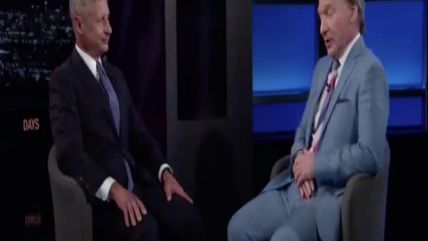Let Gary Johnson and Jill Stein Into the Debates!
The Commission on Presidential Debates should include third parties if it's at all serious about providing voters with "the best possible information"

As mentioned in this space yesterday, today is the deadline for getting presidential candidates on the ballot in Alaska, Colorado, Connecticut, Hawaii, New Hampshire, Ohio, and the District of Columbia, which will bring the number of ballot-access cutoffs to 33. (Though the invaluable Richard Winger at Ballot Access News points out that Florida, to name one state with an expired deadline, still has a back door available to the Evan McMullins of the world.) And, obviously, Ohio is weird.
At any rate, Libertarian Party nominee Gary Johnson has qualified for 39 out of 51 ballots, with the expectation of getting on all of them, and Green Party pick Jill Stein has gotten on 27 while expecting to beat 2012's total of 37. Combined with polling averages of 9 percent and 4 percent, respectively, this hard-fought ballot access should be enough to land Johnson and Stein on the debate stages this fall, I argue in today's L.A. Times. Excerpt:
The commission and its overlords are right to be pondering a tweak to the rules, if for no other reason to fulfill its stated mission, which reads in part "to ensure that debates, as a permanent part of every general election, provide the best possible information to viewers and listeners."
You cannot provide the best possible information by limiting the debate to Trump and Clinton — the two most disliked presidential nominees in modern history. Besides, even with our seemingly inevitable two-party sorting process, a full 20% of registered voters consistently indicate that they will not be pulling the lever for either D or R. Johnson and Stein, meanwhile, have combined for the same national polling percentage — just a tick below 13 — both before and after the major-party conventions, suggesting that the traditional halving of third-party polls between summer and election day might not be happening this campaign season.
Just as important, both major-party candidates back policies that are uncommonly extreme in an American context. Trump's hostility toward the free movement of human beings may get the most ink, but Clinton has embraced an economic agenda arguably to the left of anything we've seen since George McGovern, with giant college-tuition giveaways, a major ratchet in the federal minimum wage, expansions to the actuarilly suicidal entitlement state, and a batch of new taxes to magically pay for it all. The last three presidents spent considerable oxygen talking about the urgent need to reform Social Security and Medicare/Medicaid before the Baby Boom generation retires; the next one decidedly will not, unless it's Johnson.
Meanwhile, remember how FiveThirtyEight was saying that Johnson's polling was "trending downwards," suggesting (to the site's number-crunchers anyway) that "voters may be moving away from third-party options"? Well, with a raft of new national polls over the past couple of days, including an Economist/YouGov weekly survey that since early July has produced 4-5-5-5-8 and now 9 percent, FiveThirtyEight's poll-plus page has Johnson at 8.7 percent, his highest daily showing since his July 15-24 peak. He'll need do better than that, of course, but he ain't slipping.


Show Comments (38)